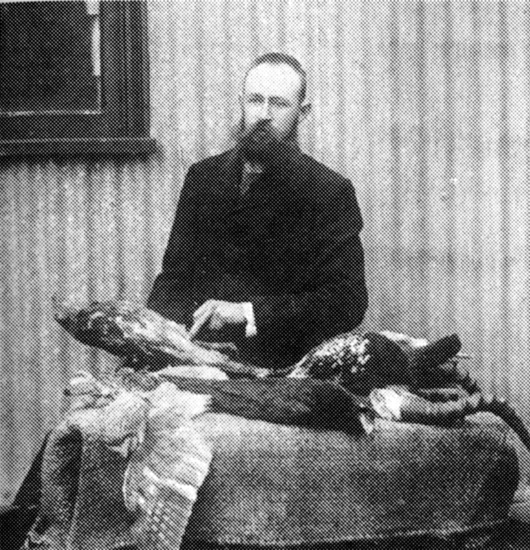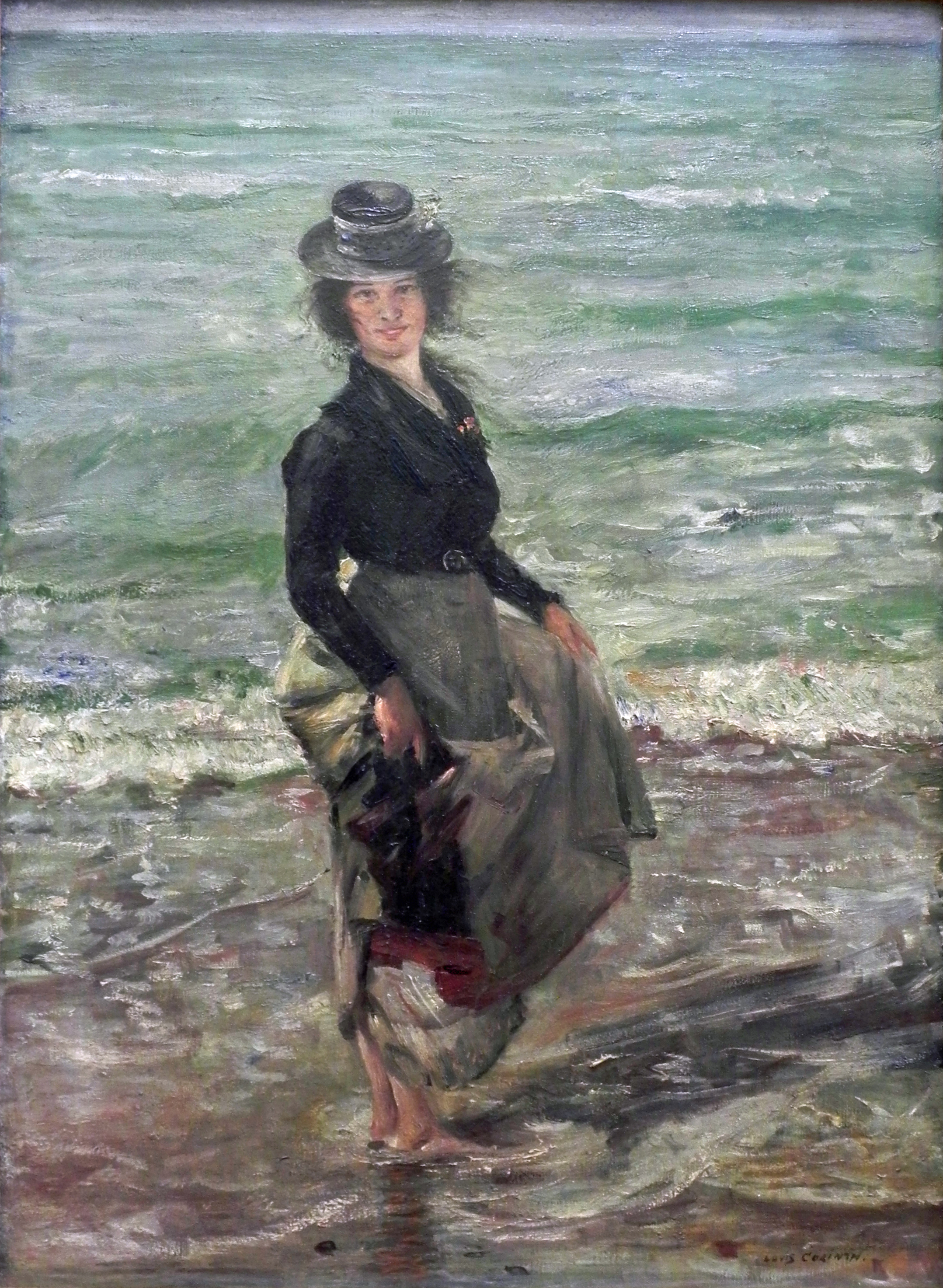|
Hugo Weigold
Max Hugo Weigold (27 May 1886 – 9 July 1973) was a German zoologist and a pioneer bird bander who worked at the Heligoland Bird Observatory, one of the world's first bird-ringing sites. Weigold was born in Dresden. He studied natural sciences and geography in Jena and Leipzig. Here he was influenced by Ernst Haeckel, Richard Woltereck, Otto zur Strassen and Carl Chun. He worked for the Scientific Commission for Marine Research in Heligoland, a German island in the North Sea, where he continued the work of Heinrich Gätke (who died in 1897) in bird migration studies, setting up the bird observatory in 1910 to trap and band the migratory birds passing through the island. For six years Weigold carried out zoological research in China and Tibet and was the first Westerner to see a live giant panda in the wild, buying a cub (which did not survive for long) while part of the Stoetzner Expedition in 1916. He later became Director of Natural Sciences at the Lower Saxony State Muse ... [...More Info...] [...Related Items...] OR: [Wikipedia] [Google] [Baidu] |
Zoology
Zoology ()The pronunciation of zoology as is usually regarded as nonstandard, though it is not uncommon. is the branch of biology that studies the Animal, animal kingdom, including the anatomy, structure, embryology, evolution, Biological classification, classification, Ethology, habits, and distribution of all animals, both living and extinction, extinct, and how they interact with their ecosystems. The term is derived from Ancient Greek , ('animal'), and , ('knowledge', 'study'). Although humans have always been interested in the natural history of the animals they saw around them, and made use of this knowledge to domesticate certain species, the formal study of zoology can be said to have originated with Aristotle. He viewed animals as living organisms, studied their structure and development, and considered their adaptations to their surroundings and the function of their parts. The Greek physician Galen studied human anatomy and was one of the greatest surgeons of the a ... [...More Info...] [...Related Items...] OR: [Wikipedia] [Google] [Baidu] |
China
China, officially the People's Republic of China (PRC), is a country in East Asia. It is the world's most populous country, with a population exceeding 1.4 billion, slightly ahead of India. China spans the equivalent of five time zones and borders fourteen countries by land, the most of any country in the world, tied with Russia. Covering an area of approximately , it is the world's third largest country by total land area. The country consists of 22 provinces, five autonomous regions, four municipalities, and two Special Administrative Regions (Hong Kong and Macau). The national capital is Beijing, and the most populous city and financial center is Shanghai. Modern Chinese trace their origins to a cradle of civilization in the fertile basin of the Yellow River in the North China Plain. The semi-legendary Xia dynasty in the 21st century BCE and the well-attested Shang and Zhou dynasties developed a bureaucratic political system to serve hereditary monarchies, or dyna ... [...More Info...] [...Related Items...] OR: [Wikipedia] [Google] [Baidu] |
1973 Deaths
Events January * January 1 - The United Kingdom, the Republic of Ireland and Denmark enter the European Economic Community, which later becomes the European Union. * January 15 – Vietnam War: Citing progress in peace negotiations, U.S. President Richard Nixon announces the suspension of offensive action in North Vietnam. * January 17 – Ferdinand Marcos becomes President for Life of the Philippines. * January 20 – Richard Nixon is sworn in for a second term as President of the United States. Nixon is the only person to have been sworn in twice as President ( 1969, 1973) and Vice President of the United States ( 1953, 1957). * January 22 ** George Foreman defeats Joe Frazier to win the heavyweight world boxing championship. ** A Royal Jordanian Boeing 707 flight from Jeddah crashes in Kano, Nigeria; 176 people are killed. * January 27 – U.S. involvement in the Vietnam War ends with the signing of the Paris Peace Accords. February * February 8 – A militar ... [...More Info...] [...Related Items...] OR: [Wikipedia] [Google] [Baidu] |
1886 Births
Events January–March * January 1 – Upper Burma is formally annexed to British Burma, following its conquest in the Third Anglo-Burmese War of November 1885. * January 5– 9 – Robert Louis Stevenson's novella ''Strange Case of Dr Jekyll and Mr Hyde'' is published in New York and London. * January 16 – A resolution is passed in the German Parliament to condemn the Prussian deportations, the politically motivated mass expulsion of ethnic Poles and Jews from Prussia, initiated by Otto von Bismarck. * January 18 – Modern field hockey is born with the formation of The Hockey Association in England. * January 29 – Karl Benz patents the first successful gasoline-driven automobile, the Benz Patent-Motorwagen (built in 1885). * February 6– 9 – Seattle riot of 1886: Anti-Chinese sentiments result in riots in Seattle, Washington. * February 8 – The West End Riots following a popular meeting in Trafalgar Square, London. * F ... [...More Info...] [...Related Items...] OR: [Wikipedia] [Google] [Baidu] |
Erwin Stresemann
Erwin Friedrich Theodor Stresemann (22 November 1889, in Dresden – 20 November 1972, in East Berlin) was a German naturalist and ornithologist. Stresemann was an ornithologist of extensive breadth who compiled one of the first and most comprehensive accounts of avian biology of its time as part of the ''Handbuch der Zoologie'' (Handbook of Zoology). In the process of his studies on birds, he also produced one of the most extensive historical accounts on the development of the science of ornithology. He influenced numerous ornithologists around him and oversaw the development of ornithology in Germany as editor of the ''Journal für Ornithologie''. He also took an interest in poetry, philosophy and linguistics. He published a monograph on the Paulohi language based on studies made during his ornithological expedition to the Indonesian island. Early life Stresemann was born in Dresden to Richard, an apothecary and Marie. His grandfather Theodor owned the ''Zum Roten Adler'' phar ... [...More Info...] [...Related Items...] OR: [Wikipedia] [Google] [Baidu] |
Ernst Hartert
Ernst Johann Otto Hartert (29 October 1859 – 11 November 1933) was a widely published German ornithologist. Life and career Hartert was born in Hamburg, Germany on 29 October 1859. In July 1891, he married the illustrator Claudia Bernadine Elisabeth Hartert in Frankfurt am Main, Germany, with whom he had a son named Joachim Karl (Charles) Hartert, (1893–1916), who was killed as an English soldier on the Somme. Together with his wife, he was the first to describe the blue-tailed Buffon hummingbird subspecies (''Chalybura buffonii intermedia'' Hartert, E & Hartert, C, 1894). The article ''On a collection of Humming Birds from Ecuador and Mexico'' appears to be their only joint publication. Hartert was employed by Walter Rothschild, 2nd Baron Rothschild as ornithological curator of Rothshild's private Natural History Museum at Tring, in England from 1892 to 1929. Hartert published the quarterly museum periodical ''Novitates Zoologicae'' (1894–39) with Rothschild, and the ... [...More Info...] [...Related Items...] OR: [Wikipedia] [Google] [Baidu] |
Otto Kleinschmidt
Otto Kleinschmidt (13 December 1870 – 25 March 1954) was a German ornithologist, theologist and pastor. Career Kleinschmidt was born as the son of the factory overseer Adolph Kleinschmidt and his wife Elise (maiden name Dreydorf) in Geinsheim (Kornsand) on the Rhine. The house of the family was located miles from anywhere in between unspoiled countryside. Otto Kleinschmidt was already as a young boy highly interested in nature and the world of the birds. Besides that it was kind of a family tradition to research and collect. Already at the age of 8 Otto prepared his first taxidermied birds. He introduced a typological species concept into German ornithology. His ''Formenkreis theory'' influenced the early ideas of Erwin Stresemann. Others have considered him one of the first biogeographers. His position was that similar "forms" (species) found in geographically distant regions could be accounted for by "formation rings" – with a fixed set of characters. This allowed him to s ... [...More Info...] [...Related Items...] OR: [Wikipedia] [Google] [Baidu] |
Bruckberg, Lower Bavaria
Bruckberg is a municipality in the district of Landshut in Bavaria in Germany. Until 30 April 1978 it belonged to the upper bavarian district of Freising Freising () is a university town in Bavaria, Germany, and the capital of the Freising ''Landkreis'' (district), with a population of about 50,000. Location Freising is the oldest town between Regensburg and Bolzano, and is located on the .... References Landshut (district) {{Landshutdistrict-geo-stub ... [...More Info...] [...Related Items...] OR: [Wikipedia] [Google] [Baidu] |
Hanover
Hanover (; german: Hannover ; nds, Hannober) is the capital and largest city of the German state of Lower Saxony. Its 535,932 (2021) inhabitants make it the 13th-largest city in Germany as well as the fourth-largest city in Northern Germany after Berlin, Hamburg and Bremen. Hanover's urban area comprises the towns of Garbsen, Langenhagen and Laatzen and has a population of about 791,000 (2018). The Hanover Region has approximately 1.16 million inhabitants (2019). The city lies at the confluence of the River Leine and its tributary the Ihme, in the south of the North German Plain, and is the largest city in the Hannover–Braunschweig–Göttingen–Wolfsburg Metropolitan Region. It is the fifth-largest city in the Low German dialect area after Hamburg, Dortmund, Essen and Bremen. Before it became the capital of Lower Saxony in 1946, Hannover was the capital of the Principality of Calenberg (1636–1692), the Electorate of Hanover (1692–1814), the Kingdom of Hannover ... [...More Info...] [...Related Items...] OR: [Wikipedia] [Google] [Baidu] |
Lower Saxony State Museum
The Lower Saxon State Museum Hanover (german: Niedersächsisches Landesmuseum Hannover, italics=unset, or simply ) is the state museum of Lower Saxony in Hanover, Germany. Situated adjacent to the New Town Hall, the museum comprises the state gallery (), featuring paintings and sculptures from the Middle Ages to the 20th century, and departments of archaeology, natural history and ethnology. The museum includes a vivarium with fish, amphibians, reptiles and arthropods. History Originally the Museum of Art and Science () inaugurated in 1856 in the presence of George V of Hanover based in the present-day Hanover Arthouse (), it was later renamed Museum of the Province of Hanover, or simply Provincial Museum. The museum soon ran out of space for its art collections, prompting the construction of the current building, designed by Hubert Stier in a Neo-Renaissance style, on the edge of the Maschpark in 1902. The building's relief frieze, titled "Key Moments in the Evolution of H ... [...More Info...] [...Related Items...] OR: [Wikipedia] [Google] [Baidu] |
Walther Stötzner
Walther is a masculine given name and a surname. It is a German form of Walter, which is derived from the Old High German ''Walthari'', containing the elements ''wald'' -"power", "brightness" or "forest" and ''hari'' -"warrior". The name was first popularized by the famous epic German hero Walther von Aquitaine and later with the Minnesänger Walther von der Vogelweide. Given name * Walther Bauersfeld (1879–1959), German engineer who built the first projection planetarium * Walther Bothe (1891–1957), German nuclear physicist and Nobel laureate * Walther von Brauchitsch (1881–1948), German World War II field marshal * Walther Dahl (1916–1985), German World War II flying ace * Walther von Dyck (1856–1934), German mathematician * Walther Flemming (1843–1905), German biologist and a founder of cytogenetics * Walther Funk (1890–1960), economist and Nazi official convicted of war crimes in the Nuremberg Trials * Walther Hahm (1894–1951), German World War II general * Wa ... [...More Info...] [...Related Items...] OR: [Wikipedia] [Google] [Baidu] |





.jpg)
